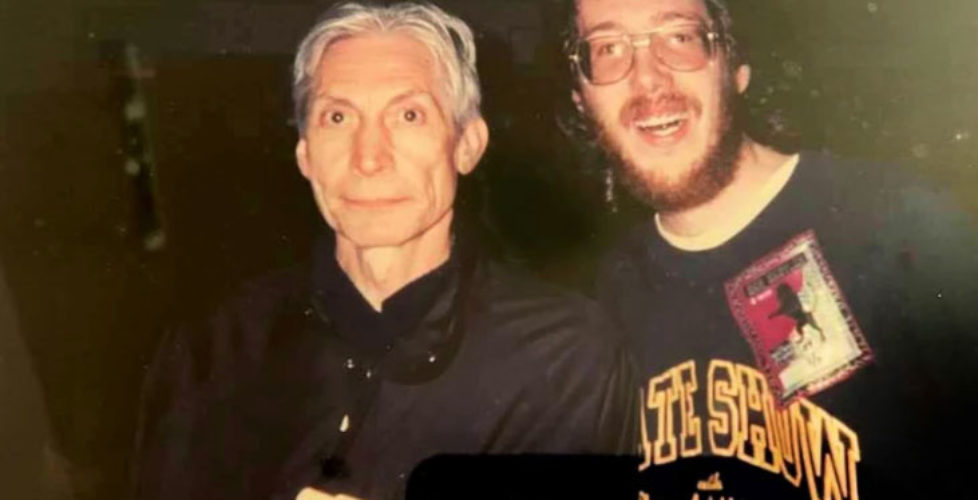Column: The Rolling Stones’ Charlie Watts was a gentleman rock star

Due to a strange series of events, David Peck says he owes his career to The Rolling Stones and drummer Charlie Watts, who died Tuesday at age 80.
They first met backstage at the memorable Rolling Stones concert at Jack Murphy Stadium on Feb. 3, 1998. Peck was sitting in the third row when a downpour erupted just as the band launched into “Gimme Shelter.”
He most recently met with Watts backstage in Pasadena’s Rose Bowl on Aug. 22, 2019, at one of the band’s final concerts before the pandemic. It was the last time he would see the legendary drummer after more than two decades of friendship bonded by the music they both loved.
Peck is quick to acknowledge they weren’t “best friends.” But over the years, Peck estimates he has rendezvoused with Watts more than 40 times backstage at music venues.
“I was always welcome. He was always gracious,” Peck says. “He never changed. He always was the same sweet person every time.”
Peck makes a living archiving and licensing music video and film footage of entertainers, performers, artists and history makers. His company, Reelin’ In The Years Productions, stores thousands of hours of music and interview footage spanning nine decades — footage that is in demand by music and film producers.
He doesn’t consider himself a VIP, but he earned a Grammy nomination in 2004 for his music video, “The American Folk Blues Festival, 1962-1966, Volume One.”
In 1984, when Peck was 18, someone showed the San Diegan a bootlegged video of The Rolling Stones’ performance on The Ed Sullivan Show in 1966, three years before the group’s young founder, Brian Jones, died.
Everything you need to know about ransomware attacks.
“It blew my mind that I could see Brian Jones’ moves … and I got bitten by the (archive) bug hard,” Peck says.
First he collected The Rolling Stones footage, added the Beatles, then branched into collecting and archiving many different styles of music and artists “from Frank Sinatra to the Sex Pistols and everything in between.”
But it was his introduction by Watts and keyboardist Chuck Leavell to a Belgian rock promoter at a Rolling Stones concert in Amsterdam on July 6, 1998, that led to his access to European music archives that catapulted his business to the next level.
Peck and Watts enjoyed a mutual love of music history. Peck often shared video footage with Watts that he thought would interest him. In 1999, Watts gave an endorsement on The Rolling Stones letterhead to Reelin’ In The Years Productions that read: “I’m impressed with the depth of David Peck’s archives, the jazz footage in particular.”

“I could sit here all day and wax eloquent about what an amazing musician Charlie was and how no one else could have been in his shoes and done what he did, but everybody knows that,” Peck says. “What most people don’t know is what a genuine, decent, loving, non-egotistical person he was.”
Not long after they met in early 1998, Watts left a voicemail on Peck’s machine. “I still have it,” he says. Watts spoke of film footage of Frank Sinatra and Fred Astaire, thanked him and said, “See you Thursday.”
Because of his profession, Peck has had the good fortune to meet and work with highly successful people in the entertainment world.
“Charlie was the nicest, hands down, and the most genuine,” Peck says. “He was an English gentleman, very proper and very nice. … He didn’t really live the rock ‘n’ roll lifestyle.”
In tribute, Peck posted some of his photos, his memories and a letter from Watts on his Facebook page.
“Charlie always signed his letters, ‘C.R. Watts (Drummer The Rolling Stones)’ — as if there could be another one.”
One of Peck’s favorite tales took place at a 1998 Stones performance at the Hard Rock Casino in Las Vegas. He was waiting in a makeshift backstage area with Johnny Depp, Brad Pitt and Pamela Anderson.
“I’m not an A-lister. I don’t even make the alphabet,” Peck jokes. Nevertheless, when ticket sales manager Shelley Lazar lifted the curtain to the adjacent room, she announced: ‘David, Charlie will see you now.’”
“Brad Pitt was looking at me as if to say, ‘Who the hell is he?’
Watts greeted Peck and escorted him into a kitchen area and a seat next to Penny Marshall.
“He looks at me and says in a sweet voice, ‘David, can I get you anything?’
“I’m looking at him and thinking to myself how much joy his music had given me and he’s asking me if there’s anything he can get for me?”
Another memorable moment that night was when he asked Watts if he planned to tour that summer with the Stones. “He leans into me and says, ‘They won’t let me leave.’”
Watts referred to his band cohorts as “they,” almost as though they were separate entities, Peck says.
“He didn’t take anything for granted. He didn’t expect anything because he was a rock star. He was just a regular guy.”
